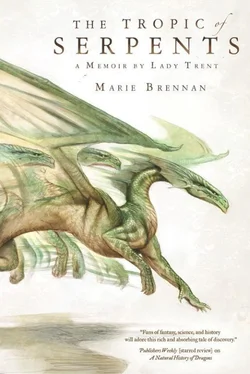“May I see?” I asked. Mrs. Kemble led us into the cellar, presently in a state of half gloom, the only light coming in by the street-level windows. It was enough to show the destruction: shattered glass everywhere, measuring instruments bent and smashed. A chemical stink flooded the air, despite the open windows and a boy outside cranking a device to ventilate the room. They had not merely taken Kemble’s notes; they had also done what they could to delay his further progress.
I held my handkerchief over my nose and said, “Mrs. Kemble, I am so very sorry. If you send a letter to my accountant, I’ll see to it that you’re reimbursed for what you’ve lost. It can’t restore your peace of mind, but—” I gestured helplessly. “It can at least replace the glassware.”
“That’s very good of you, Mrs. Camherst,” she said, mollified. “Kemble is upstairs; I needed him out from under my feet while I sort out what’s broken and missing. Lucy will make you some tea.”
Mr. Wilker and I went obediently up to the parlour, where we found Frederick Kemble scribing furiously onto a loose sheet of foolscap. Others like it were scattered across the table and the floor, and Lucy, the Kembles’ remaining unmarried daughter, was trying to find a clear space to set down a tray containing not only tea but a stack of blank paper. She saw us come in and touched her father’s elbow. “Papa—”
“Not now—let me—” He jerked his head in a motion I thought was meant to stand for a wave of his hand, his actual hands being occupied in note-taking.
Lucy retreated to our side. “What is he doing?” I asked, not daring raise my voice above a murmur.
“Writing down as much as he can remember,” she said. “From the notebooks that were taken.”
After three years’ work, the process for preserving dragonbone must have been engraved on the inside of his eyelids; I had it memorized, and I was not even chemist enough to understand what most of it meant. As for the rest—“Mr. Wilker said the most recent notebook was not taken, yes? So long as we have that, the older notes do not matter half so much.” Most of them were obsolete by now, documenting failed experiments.
Lucy spread her hands. “He says even the old notes are important—that he likes to look over them from time to time.”
She went off to fetch more teacups, and then Mr. Wilker and I settled in at the far end of the parlour to hear Lucy’s account of the break-in and the investigation thus far. By the time she finished, Kemble was ready to pause in his work and acknowledge the rest of the world.
“If they’d come before the Sabbath…” he said, clearly grateful they had not. His daughter presented him with a cup of tea, which he took and drained absently. “I was looking back through the old notebooks during lunch on Eromer, and something there caught my attention. Last year, I—”
Mr. Wilker, who had long since learned to recognize the warning signs, cut him off before he could descend into a thicket of scientific language I would not understand in the slightest. The body of our collective knowledge has grown so rapidly in my lifetime that although I am accounted an extremely learned woman, there are whole fields I know very little of; chemistry is one such. It was not a part of young ladies’ curricula in my youth, and my self-education had gone in other directions. Mr. Wilker therefore diverted our chemist to the points he knew I would care about. “You said something about that this morning, yes. It gave you an idea?”
“I think so,” Kemble said. “It’s only a thought so far; it will take a great deal of testing. But I may have an idea for synthesis at last.”
Had that not been the fifth time I heard those words from his mouth, I would have been more excited. It was, after all, the purpose for which we had hired Kemble. We knew how to preserve dragonbone; that was no longer a challenge. But Mr. Wilker and I, discussing the matter three years ago, had seen the peril in that knowledge.
Quite apart from the desire of hunters to preserve their trophies, and the desire of natural historians to study their subject at leisure post mortem, the qualities of dragonbone made it attractive to other kinds of person. Its mechanical properties were far superior to those of iron and steel, being both lighter and stronger—and as the easily accessible iron deposits in Anthiope and other parts of the world began to run dry, the value of any alternative grew by the year.
I could enumerate at length the drawbacks to the industrial use of dragonbone. Indeed, I had an article already prepared on the subject, ready to send at a moment’s notice to all the reputable publications. Dragons were even rarer than iron, and while it was true that they reproduced (which ore was not known to do), any widespread demand for their bones would lead to mass slaughter, perhaps even to extinction. The irregular shape of many bones rendered them less than ideal for the construction of machines, which would result in a great deal of waste. The expense and hassle of harvesting them from dead dragons (many of whom lived in locales as foreign and distant as those still rich in iron) rendered the prospect less than entirely profitable. It went on for pages, but the entire thing was flawed in its basic assumption, which was that people would consider the matter rationally before making their decisions.
The truth was that the idea would bring speculators flocking like vultures to a dead horse, ready to pick the bones clean. And if I tried to persuade myself that I was exaggerating—that such a doom-filled scenario would never come to pass—I had only to consider the Erigan continent, where the lure of iron had led several Anthiopean states to involve themselves in the affairs of the nations there. If Thiessin was willing to conquer Djapa, and Chiavora to encourage revolution in Agwi, and Scirland to insert itself between the Talu Union and the military might of the Ikwunde, for the sake of being able to build new steam engines, we would not hesitate to sacrifice a few dumb beasts.
I sighed and drained the last of my tea. “With all due respect, Mr. Kemble, I would almost welcome another set of eyes on the matter. I have every confidence that you can solve this riddle, given sufficient time—but that, we may not have. Sooner or later someone will figure out Rossi’s method, even without your notes. If we are to avert chaos, we need a way to satisfy the demand for this substance that does not involve butchering dragons.”
“I doubt we’ll be that lucky,” Mr. Wilker said, sounding bleak. “With the eyes, that is. How many people will go to the amount of effort you and I have, just to spare animals? We already butcher elephants for their ivory and tigers for their skins, and those are only decorative.”
He was likely right. Sighing, I said, “Then we had best hope the police recover the notebook—small hope that it is. Do we have any notion who took it?”
By the grim silence that fell, the answer started with “yes” and got worse from there. Mr. Wilker replied obliquely. “You know about the symposium, I think.”
A gathering of scholars, hosted by the Philosophers’ Colloquium, the preeminent scientific body in Scirland. Mr. Wilker had not been invited to attend, because he was not a gentleman. I had not been invited to attend either, because although my birth was gentle, I was not a man.
But we knew someone who met both of those requirements. “If it was one of the visitors, Lord Hilford might be able to find out.”
“He won’t have much time,” Kemble said, coming out of the reverie into which he so frequently lapsed. “Doesn’t that end this week?”
It did, and the scholars would be returning to their homelands. “Indeed. Then I suppose I know what I am doing with my afternoon.”
Читать дальше












